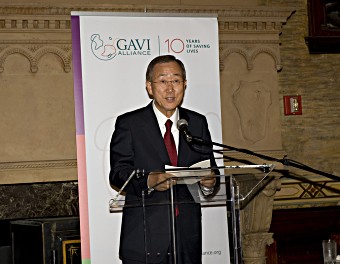Immunisation's vital role in UN health strategy

Ban Ki-moon, UN Secretary General, addresses attendees at the launch of GAVI's first replenishment process in New York. GAVI/2010/Lynn Saville.
New York, 6 October 2010 -- Immunisation and the work of the GAVI Alliance is vital to the UN's global strategy to improve the health of hundreds of millions of women and children by expanding access to basic healthcare, UN Secretary-General Ban Ki-moon said at the launch of the GAVI Alliance's first replenishment process in New York.
"The GAVI Alliance is poised to accelerate the introduction of life-saving vaccines - a plan that can prevent more than four million deaths," the UN Secretary-General said on Tuesday evening at the start of a meeting of existing and potential GAVI donors and partners in New York.
"By making the most of our partnerships, by empowering others to lead, by promoting innovation on all fronts, we can get more health for our money," he added. "Immunisation - and all the work of the GAVI Alliance - is a key part of our strategy. Let us commit to increasing the funds available to the GAVI Alliance."
A call for action and resources
By making the most of our partnerships, by empowering others to lead, by promoting innovation on all fronts, we can get more health for our money. Ban Ki-moon, UN Secretary-General |
GAVI Alliance partners are meeting in New York to agree on how to fund programmes to avert an estimated 4.2 million future deaths through immunisation. The meeting will set the stage for a pledging conference in 2011. GAVI needs to raise US$4.3 billion to scale-up immunisation programmes in developing countries between 2010 and 2015.
The funding that GAVI is requesting would, in part, pay for the introduction of new vaccines to tackle major causes of the world's two biggest childhood killers, pneumonia and diarrhoea -- the leading causes of child mortality, together accounting for nearly 40% of all child deaths.
The investment will also ensure the sustainability of the five-in-one pentavalent vaccine introduced by GAVI to increase basic coverage against diphtheria, tetanus and pertussis (DTP), while also protecting children against Hepatitis B and Hib.
Mary Robinson, Chair of the GAVI Alliance Board, thanked the Governments of United States and Norway for co-chairing the meeting and for demonstrating leadership in addressing the GAVI resource mobilisation challenge.
United States co-chair Dr. Ezekiel J. Emanuel, highlights GAVI's potential to make a "major step forward" for global vaccination and protect the lives of millions of children in the developing world.
Effective investment against deadly diseases
"Immunisation is one of the most powerful development interventions that we have. It is proven and cost-effective," the former Irish President said. "Although GAVI Alliance members have made enormous progress so far, we have much more to do to protect millions of children who are still dying from vaccine-preventable diseases. We will not rest until all children in the developing world are reached with vaccines."
"The money GAVI is asking for will allow millions of children in developing countries like mine to grow up free from disease, go to school, and lead full, healthy, and productive lives," said Dr Victor MaKwenge Kaput, Public Health Minister of the Democratic Republic of the Congo.
"We are now reaching more than 90% of children with routine immunisation," said Professor A.F.M. Ruhal Haque, Bangladesh's Health Minister. "With GAVI's help we can introduce new vaccines against pneumococcal disease which will empower us to tackle the biggest killer of children under five in Bangladesh."
Norwegian co-chair Vice-Minister Espen Barth Eide said "GAVI's results on the ground speak for themselves and explain why Norway considers immunisation to be one of the best buys in global public health. We will continue to provide significant support to GAVI as part of the UN Secretary-General's Global Strategy for Women's and Children's Health to further drive reductions in child mortality and poverty."
United States co-chair Dr. Ezekiel J. Emanuel, said "As a founder of the GAVI Alliance, and by co-chairing this action meeting, the U.S. is pleased to strengthen our continued commitment to the GAVI Alliance and to its ambitious goals. We're all here because GAVI's track record of 5.4 million lives saved makes it both a good investment for the world, and a source of hope."
